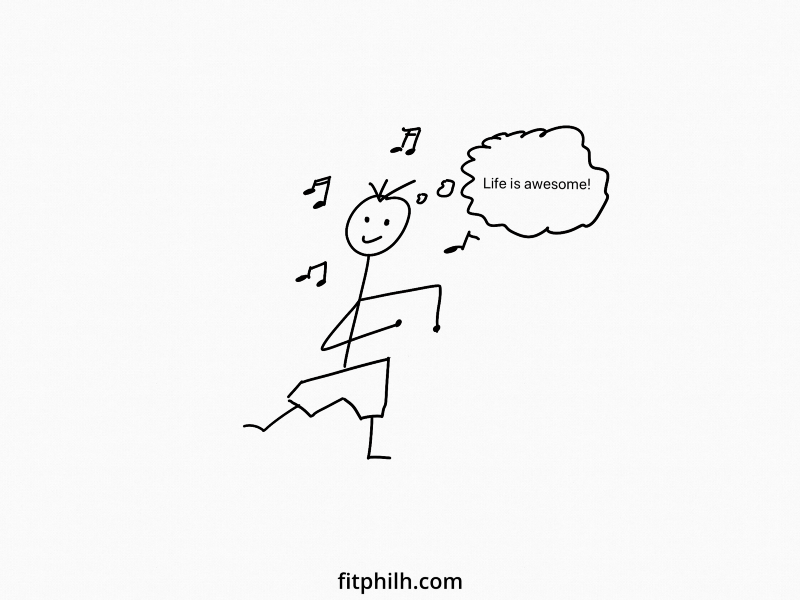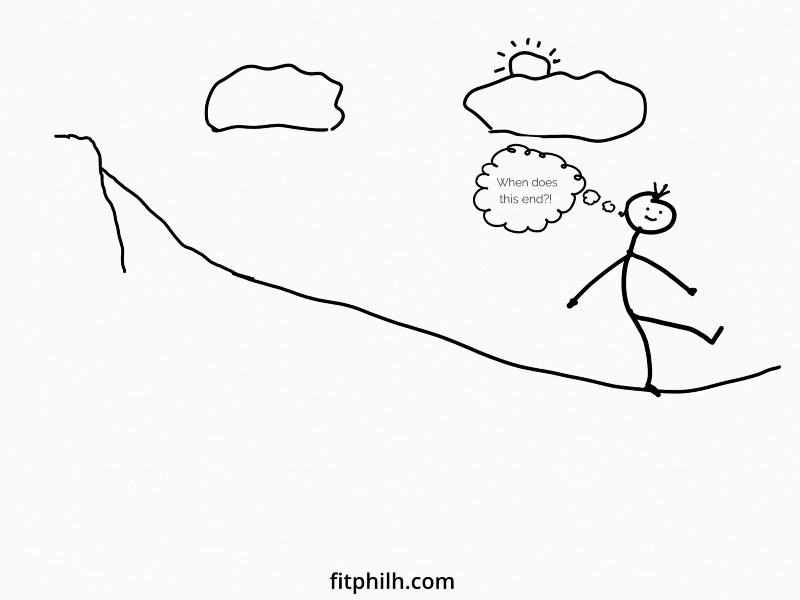The Tightropes Of Life — Or Why We Will Never Win Our Battles
You are a tightrope artist. If you want to or not.
You are a tightrope artist. If you want to or not.
Living life is walking a tightrope. Actually, several tightropes.
Keeping your balance on those tightropes is a battle. A constant battle. One you will never win. In fact, it’s one you cannot win. No one can.
And yet, walking the tightropes is the only way to move forward in life. If you don’t move, you get stuck. If you fall off, you get stuck.
THE TIGHTROPES OF LIFE
It might not be immediately obvious to you that you are a tightrope artist. But everyone is — inevitably.
Chances are, you’ve fallen off one of them already.
Although there are many tightropes of life, two cast their shadows over many others.
Essentially, there are two big battles we fight with ourselves each day, trying to move forward.
BATTLE #1 – CHANGE vs. ACCEPTANCE
CHANGE
No one ever changed their life by accepting the status quo. If you believe it is possible, it is possible.
“If you don‘t like how things are, change it. You are not a tree.” (Jim Rohn)
All of this sounds really convincing, even motivating, right?
Much of the advice that comes out of the self-help industry today circulates around the idea of that whatever you put your mind and energy to, you attract.
Around the belief that you are the creator of your own life. That you define reality.
Personally, I strongly gravitate towards this attitude and I see great value in developing one‘s mindset around that belief.
ACCEPTANCE
However, there is a perspective that is almost diametrical (“in exact opposition to”):
Happiness arises when you get rid of the illusion that you control everything.
The view you can’t really change much after all. And that you have to accept whatever life throws at you.
It‘s a traditionally more eastern view, strongly embedded in Daoist and Buddhist philosophy – also embraced by the now-popular-again Stoics (as praised by heavyweights like Tim Ferriss and Ryan Holiday).
“For, after all, the best thing one can do when it is raining, is to let it rain.” (Henry Wadsworth Longfellow)
Doesn‘t this sound really wise and, well, kind of true?
It does to me. And it is, I guess.
But which view is the right one now?
THE TIGHTROPE
The answer is both. You have to balance them. Walking the tightrope.
Sometimes you have to push through, go hard, hustle and grind, believe in yourself, your abilities and the influence you have over your own life.
And not give up. To make happen what you wish to be true.
Sometimes, though, you have to accept that you can’t do shit.
Like when it’s raining. The best thing you can do then is to buy a raincoat. Or stay at home.
Or, better yet, go outside, dance in the rain, jump into every puddle you see and laugh like a maniac. (You should do that, obviously.)
In my view, “balancing” the tightrope of Change vs. Acceptance requires you to identify and focus on what Stephen Covey (“The 7 Habits of Highly Effective People”) calls your Circle of Influence.
Put your energy to that which is under your direct or indirect control (which is usually more than we tend to think). Accept that which isn’t.
Identifying the boundaries between “I can change this” and “I have to accept this” is a life’s task. Trial and error. Over and over and over (and over) again. You can get better at it (and you should!), but you will never win. Simply because the challenge of identifying the boundaries of your influence always arises anew.
“God, grant me the serenity to accept the things I can’t change, the courage to change the things I can, and the wisdom to know the difference.” (Reinhold Niebuhr)
Just leave God out of the equation. He’s usually busy helping people pass exams, win football games and make children not get eaten by the monsters under their beds.
P.S.: I’ve written a whole article dedicated to this battle here. It’s cool, it has grizzlies and pandas in it!
BATTLE #2 – GROWTH vs. APPRECIATION
GROWTH
“True nobility is being superior to your former self.” (Ernest Hemingway)
Your level of success will seldom exceed your level of personal development. Your happiness is predicated on your continuous growth. A prosperous life is fuelled by your ambition.
Sounds motivating, right? Sounds right.
What we should strive for is a better version of ourselves.
Every day. Whatever that means.
Losing weight. Gaining muscle. Eating better. Looking sexier. Making more money. Working more efficiently. Creating more. Living in a nicer home. Knowing more. Speaking more languages. Driving a faster car. Reading more. Writing better articles on Medium (#notetomyself).
“Improvement” can mean a gazillion different things. Sure, some are more worth pursuing than others. Some, you probably shouldn’t pursue at all.
But whatever it is that you are trying to improve in, get more of, or become better at, and however useful this might be — there’s always this voice escorting any efforts of yours, singing the bittersweet song of “Ain’t Enough”.
Our default motivation for developing ourselves, and for improving our lives for that matter, very often is a feeling of inadequacy. A judgement coming from within, surfacing the idea that we are lacking something — whether that’s a thing in our environment or something about us as a person.
I personally hold (and actively cultivate) the view that growing as a person is one of the central missions we have — with everything that comes along for the ride: more knowledge of the world, other people, and yourself, better health, being more kind to others, setting better examples.
APPRECIATION
Yet, I also fully subscribe to and emotionally align with the idea that being grateful for what we are and what we have in the present moment is the key to contentment, fulfillment, and, eventually, happiness.
“Do not spoil what you have by desiring what you have not; remember that what you now have was once among the things you only hoped for.” (Epicurus)
Happiness means to not wish for the reality to be any different.
Realizing that whatever person we are, whatever circumstance we find ourselves in, whatever we have and do not have — is the next best thing to be happy with.
In my kitchen, I have the following framed, sitting on my counter:
“Someone else is happy with less than what you have.”
It reminds me of that we tend to lose our grip on what it means to appreciate our lives. Of that it is not about what or how much you have, but what it means to you and what you make of it.
Both research and reason tell us that cultivating gratitude is vital to a fulfilled and happy life. Being fully aware of and appreciating that which is your reality today, right now, gives your experience of life a quality you want.
But doesn’t this view clash with the idea that (self-)improvement and growth is so important and good?
It doesn’t have to.
THE TIGHTROPE
I believe the secret lies in striving to constantly grow as a person (which includes your knowledge and abilities) and developing one’s environment (which includes everything you own) from a position of appreciation for that which constitutes one’s life right now.
We should not see our efforts as merely a means to an end, escaping from the insufficiencies of the present, rushing towards promises of fulfillment at a mysterious moment in the future.
We ought to rather indulge in the process as such, immersing into the experience of a dynamic, changing, evolving life. Feeling the pleasures from being the agent of that process, always staying in awareness of the present.
Cherishing the process more than the result, and staying grounded in deep gratitude for everything we have and everything we are. Because we could always have less. And we could always not be. (Just let that sink in for a second.)
Putting in effort to become a better person doesn’t just pay off in terms of getting more of what you (think) you want (although this will be a nice side-effect of personal development).
Maybe even more important is that you will get more out of life as such. Actually, you will get more life. More of the process of living. More of what it means to live a life that is worth living.
And nothing about that renders that which you have and are today any less good, beautiful, and worth to be grateful for.
Practicing to become a better dancer is not just cool because you will have more dancing skills to show off (although that’s pretty cool). It’s awesome because the practice as such is fun. Dancing, whatever level you’re at, is fun.
And even if you suck at dancing right now, you can still enjoy dancing (awkwardly). Because it’s still better than not being able to dance at all.
And your becoming a better dancer doesn’t take anything away from the joy that dancing brings into your life, even if you aren’t where you would like to be (yet).
Essentially, Growth vs. Appreciation is not really a battle in terms of “either or”. You want both. Always.
Essentially, you’re fighting to not focus too strongly on only one perspective.
WHY YOU CAN NEVER WIN
Every step on the tightropes of life is a battle. A battle to maintain balance and not fall off either side. And these battles, you can‘t win. But you don’t have to lose them, either.
You simply will always have to keep fighting them, basically every single day, with every decision you make. Sure, you can keep your balance really well. But that doesn‘t keep you from having to balance out the next step again. And again. And again.
The tightropes never end. (Unless when you die, of course.)
And that‘s okay.
In fact, that is what life is. It‘s not something that stands in your way of living. It’s not something you have to overcome in order to live.
It simply is living.
I mean, think about it. What do you think your life really is? Not what it is like. But what it is.
I‘m not talking about the metaphysical meaning or purpose of it or reason for it.
I‘m talking about life as an inescapable process of subjective experience.
Your life is a chain of decisions. Whatever it is you are spending your time with, you are always coming to that thing via a decision. Be that a conscious or an unconscious decision. And every decision will make you lean towards either side of the tightropes of life — even if the change is immeasurably small.
MORE TIGHTROPES, MORE BATTLES
Now, Change vs. Acceptance and Growth vs. Appreciation are two very challenging balancing acts we have to perform every single day. Two battles we keep fighting.
There are a few more, though. Actually, many more.
Here’s a selection — take a minute to think about how these apply to your own life.
Selfishness vs. Contribution
Entertainment vs. Education
Enjoyment vs. Investment
Activity vs. Rest
…
CALL TO ACTION
If you liked this article, please hit that clapping hand on the left (tap and hold to see what happens).
Also, subscribing to my mailing list below is the second best thing you can do today. I promise!
You’ll receive a lot of awesome, educational and inspirational resources, as well as the occasional motivational message.








